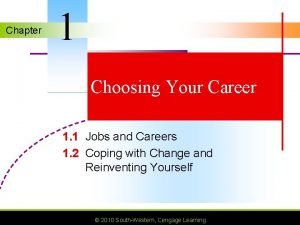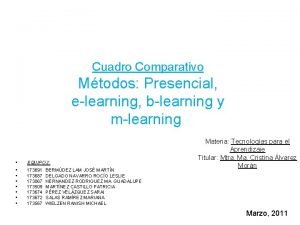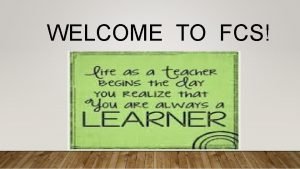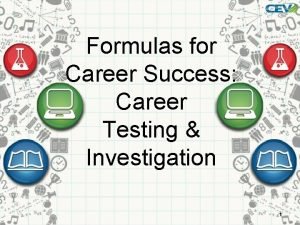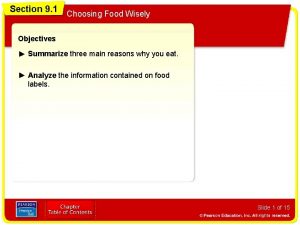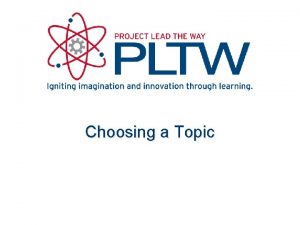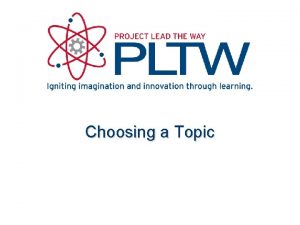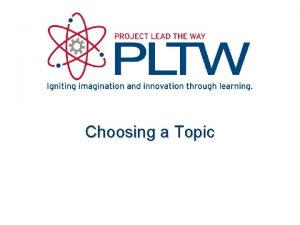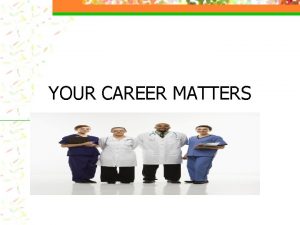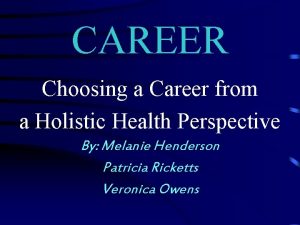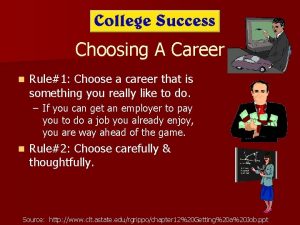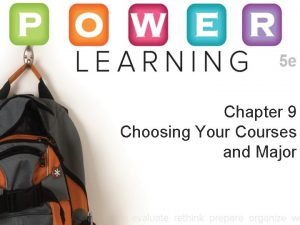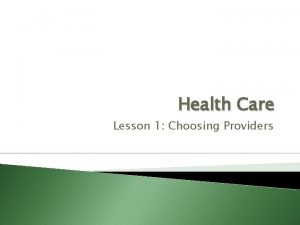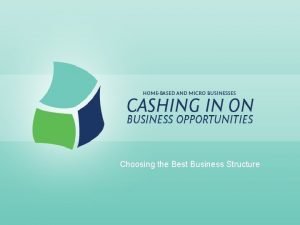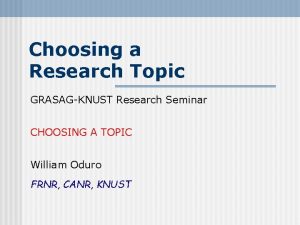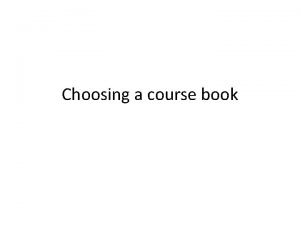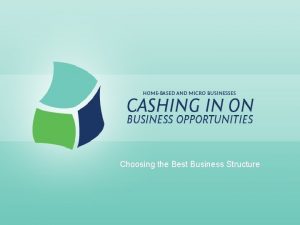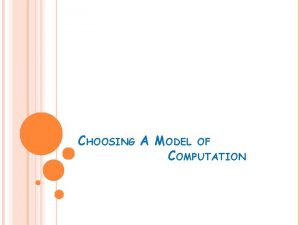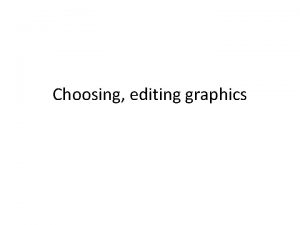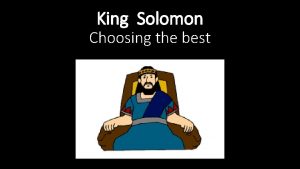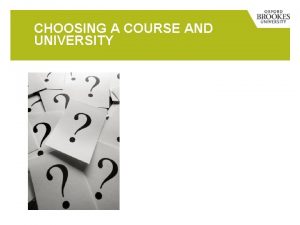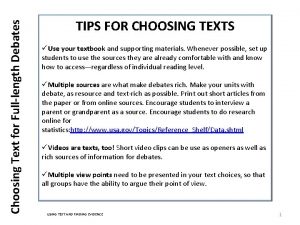From career choosing to career learning The new














































- Slides: 46

From career choosing to career learning The new role for the career guidance professional Tristram Hooley

The parable of the three fishermen • Saving people – career crisis support • Stopping them falling in – pre-emptive career support • Teaching them to swim – career management learning

Overview Definitions Matching Critiques of matching A new paradigm Frameworks for practice

Overview Definitions Matching Critiques of matching A new paradigm Frameworks for practice

What is career? Career is… the individual’s journey through life, learning and work.

A journey or a race?

So what is career guidance? • career learning/career education/career counselling/careers advice? • karriereveiledning?


Defining career guidance “Career guidance supports individuals and groups to discover more about work, leisure and learning and to consider their place in the world and plan for their futures… Career guidance can take a wide range of forms and draws on diverse theoretical traditions. But at its heart it is a purposeful learning opportunity which supports individuals and groups to consider and reconsider work, leisure and learning in the light of new information and experiences and to take both individual and collective action as a result of this. ”

Reflection • Think about your own career. • What/who have been the biggest influences on your career so far? • What professional help have you received with your career?

So…there are • different ways of thinking about career • different ways of helping people with their career • different reasons for trying to help people

Overview Definitions Matching Critiques of matching A new paradigm Frameworks for practice

Career as decision making


Choosing a vocation (1909) No step in life, unless it may be the choice of a husband or wife, is more important than the choice of a vocation… You may not be able to get into the right line of work at first. You may have to learn your living for a while in any way that is open to you. But if you study yourself and get sufficient knowledge of various industries to determine what sort of work you are best adapted to, and then carefully prepare yourself for efficient service in that line, the opportunity will come for you to make use of the best that is you in your daily work.

Parsons’ method In the wise choice of a vocation there are three broad factors: 1. a clear understanding of yourself, your aptitudes, abilities, interests, ambitions, resources, limitations and their causes; 2. a knowledge of the requirements, and conditions of success, advantages and disadvantages, compensation, opportunities and prospects in different lines of work; 3. true reasoning on the relations of these two groups of facts.

The need for a ‘scientific’ allocation of human resources


John Holland RIASEC “…people tend to act on their dominant interests and seek occupations in which their interests can be expressed. ” (Holland 1996: 400)

Discussion • What do you think about these matching theories? • How effective do you think they are? • Why are they appealing? • What are the problems with them?

Overview Definitions Matching Critiques of matching A new paradigm Frameworks for practice

My story

Themes in my career development • • Changing my mind Exploring new things Luck Going with opportunities Keeping an open mind Moving on when I get fed up Being constrained by organisations and structures

Problems with matching • People (and labour markets) are complex • People (and labour markets) change • Social structures give us less opportunities for decision making than it might initially appear.

Career deals with chaos and complexity We are always changing. The world and the labour market are always changing. Career guidance deals with the relationship between the two.

Super’s life/career rainbow

Structures limit choices

Learning to labour People make very few career choices. They work within the structures that they are presented with. This offers the illusion of choice and even of resistance. But actually most people end up following very predictable career paths.

We don’t career alone

Discussion • Talk about some of these critiques of matching theories. • Do you agree with them? • Where do you think that they’ve got it wrong? • What does it require from careers professionals?

Overview Definitions Matching Critiques of matching A new paradigm Frameworks for practice

A paradigm change There is a need to shift the focus of career guidance. Places decision making at the heart of the process From ‘test and tell’ A medical model where we solve people’s problems Views the process as lots of actions across the lifecourse To ‘explore and learn’ An educational model where we teach knowledge and skills

So what are the implications? A changing understanding of the role of career ask us to think differently about our practice. So what does this mean?

#1 Remember careers are lifelong

#2 Shift to a focus on learning

#3 Career learning is experiential learning

#4 Think broadly about how you can help

#5 Don’t pretend you have all the answers

#6 Link people to other people

#7 Be prepared to challenge structures

Overview Definitions Matching Critiques of matching A new paradigm Frameworks for practice

A social justice model of guidance Reframe the concept of career more broadly Encourage people to learn about the world and build a critique of it Recognise power dynamics and be willing to discuss them. Socialise Encourage people to talk about their context and the people who matter to them. Think of social capital as a career resource. Build community capacity. Open up the possibility for collective solutions as well as individual solutions. Act Empower individually and collectively Advocate for those who can’t speak for themselves Provide feedback at a system level (notice common problems)

A career education curriculum Who am I? How does the world work? Where do I fit into the world? How can I/we live with others? How do I/we go about changing the world?

References • • Ginzberg, E. , Ginsburg, S. W. , Axelrad, S. , & Herma, J. L. (1951). Occupational choice: An approach to a general theory. New York: Columbia University Press. Holland, J. L. (1997). Making vocational choices Hooley, T. , Sultana, R. G. and Thomsen, R. (2017). The neoliberal challenge to career guidance - mobilising research, policy and practice around social justice. In Hooley, T. , Sultana, R. G. and Thomsen, R. (Eds. ) Career guidance for social justice: Contesting neoliberalism. London: Routledge. Organisation for Economic Co-operation and Development. (2004). Career guidance and public policy: Bridging the gap. Paris: OECD. Parsons, F. (1909). Choosing a Vocation. Roberts, K. (1977). The social conditions, consequences and limitations of career guidance’, British Journal of Guidance and Counselling, 5, 1 -9. Super, D. E. (1990) A life-span, life-space approach to career development. In Brown, D. Brooks, L. & Associates (Eds. ). Career Choice and Development. San Francisco: Jossey. Bass, pp 197 -261. Willis, P. (1977). Learning to labour. Farnborough: Saxon House.

In conclusion • Career guidance has been very influenced by the idea of the “match”. • But there is good reason to be sceptical about this and to rethink what you are doing. • New models emphasise lifelong career development and its interaction with structures and other people. • There are many models of practice that can help us to operationalise this.

My contacts • Email thooley@careersandenterprise. co. uk • Twitter @pigironjoe • Blog https: //adventuresincareerdevelopment. wordpress. com/
 Chapter 1 choosing your career
Chapter 1 choosing your career Cuadro comparativo de e-learning
Cuadro comparativo de e-learning National fcs standards
National fcs standards Formulas for career success
Formulas for career success Hát kết hợp bộ gõ cơ thể
Hát kết hợp bộ gõ cơ thể Frameset trong html5
Frameset trong html5 Bổ thể
Bổ thể Tỉ lệ cơ thể trẻ em
Tỉ lệ cơ thể trẻ em Gấu đi như thế nào
Gấu đi như thế nào Tư thế worm breton là gì
Tư thế worm breton là gì Bài hát chúa yêu trần thế alleluia
Bài hát chúa yêu trần thế alleluia Các môn thể thao bắt đầu bằng từ đua
Các môn thể thao bắt đầu bằng từ đua Thế nào là hệ số cao nhất
Thế nào là hệ số cao nhất Các châu lục và đại dương trên thế giới
Các châu lục và đại dương trên thế giới Cong thức tính động năng
Cong thức tính động năng Trời xanh đây là của chúng ta thể thơ
Trời xanh đây là của chúng ta thể thơ Cách giải mật thư tọa độ
Cách giải mật thư tọa độ Làm thế nào để 102-1=99
Làm thế nào để 102-1=99 độ dài liên kết
độ dài liên kết Các châu lục và đại dương trên thế giới
Các châu lục và đại dương trên thế giới Thơ thất ngôn tứ tuyệt đường luật
Thơ thất ngôn tứ tuyệt đường luật Quá trình desamine hóa có thể tạo ra
Quá trình desamine hóa có thể tạo ra Một số thể thơ truyền thống
Một số thể thơ truyền thống Cái miệng nó xinh thế
Cái miệng nó xinh thế Vẽ hình chiếu vuông góc của vật thể sau
Vẽ hình chiếu vuông góc của vật thể sau Thế nào là sự mỏi cơ
Thế nào là sự mỏi cơ đặc điểm cơ thể của người tối cổ
đặc điểm cơ thể của người tối cổ Thế nào là giọng cùng tên? *
Thế nào là giọng cùng tên? * Vẽ hình chiếu đứng bằng cạnh của vật thể
Vẽ hình chiếu đứng bằng cạnh của vật thể Tia chieu sa te
Tia chieu sa te Thẻ vin
Thẻ vin đại từ thay thế
đại từ thay thế điện thế nghỉ
điện thế nghỉ Tư thế ngồi viết
Tư thế ngồi viết Diễn thế sinh thái là
Diễn thế sinh thái là Dạng đột biến một nhiễm là
Dạng đột biến một nhiễm là Bảng số nguyên tố
Bảng số nguyên tố Tư thế ngồi viết
Tư thế ngồi viết Lời thề hippocrates
Lời thề hippocrates Thiếu nhi thế giới liên hoan
Thiếu nhi thế giới liên hoan ưu thế lai là gì
ưu thế lai là gì Hổ sinh sản vào mùa nào
Hổ sinh sản vào mùa nào Khi nào hổ mẹ dạy hổ con săn mồi
Khi nào hổ mẹ dạy hổ con săn mồi Sơ đồ cơ thể người
Sơ đồ cơ thể người Từ ngữ thể hiện lòng nhân hậu
Từ ngữ thể hiện lòng nhân hậu Thế nào là mạng điện lắp đặt kiểu nổi
Thế nào là mạng điện lắp đặt kiểu nổi Choosing foods wisely quiz
Choosing foods wisely quiz
